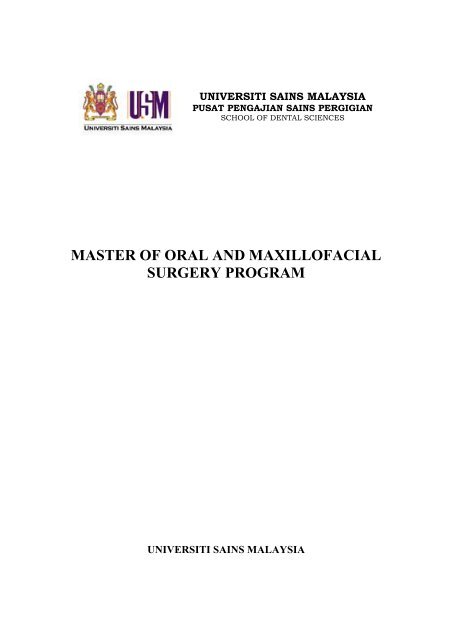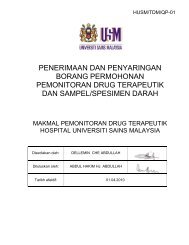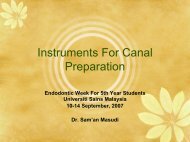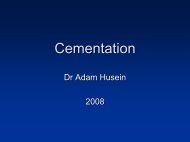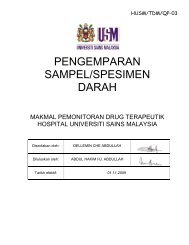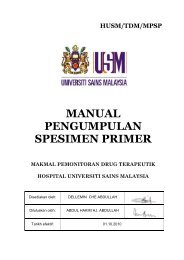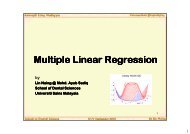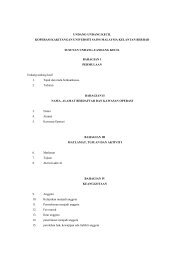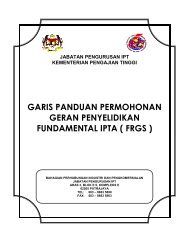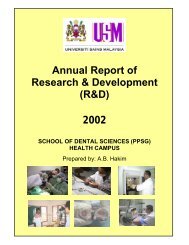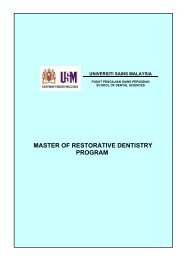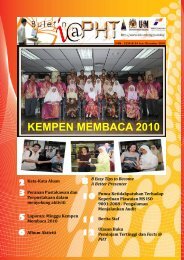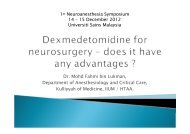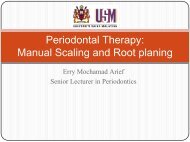Master of Oral and Maxillofacial Surgery program
Master of Oral and Maxillofacial Surgery program
Master of Oral and Maxillofacial Surgery program
Create successful ePaper yourself
Turn your PDF publications into a flip-book with our unique Google optimized e-Paper software.
UNIVERSITI SAINS MALAYSIA<br />
PUSAT PENGAJIAN SAINS PERGIGIAN<br />
SCHOOL OF DENTAL SCIENCES<br />
MASTER OF ORAL AND MAXILLOFACIAL<br />
SURGERY PROGRAM<br />
UNIVERSITI SAINS MALAYSIA
1. INTRODUCTION:<br />
The <strong>Master</strong> <strong>of</strong> <strong>Oral</strong> <strong>and</strong> Maxill<strong>of</strong>acial <strong>Surgery</strong> is a new surgical specialty<br />
<strong>program</strong>, which will be <strong>of</strong>fered by the School <strong>of</strong> Dental Sciences, Universiti<br />
Sains Malaysia.<br />
It is planned to train dental graduate to be a specialist in <strong>Oral</strong> <strong>and</strong><br />
Maxill<strong>of</strong>acial surgery. This will cater to the need <strong>of</strong> the country in the<br />
specialty <strong>of</strong> oral <strong>and</strong> maxill<strong>of</strong>acial surgery <strong>and</strong> to be recognized<br />
internationally.<br />
2. BACKGROUND:<br />
The <strong>program</strong> in <strong>Oral</strong> <strong>and</strong> Maxill<strong>of</strong>acial surgery is a continuous 48-month<br />
course duration that prepares the graduate for the practice <strong>of</strong> oral <strong>and</strong><br />
maxill<strong>of</strong>acial surgery. <strong>Oral</strong> <strong>and</strong> Maxill<strong>of</strong>acial <strong>Surgery</strong> covers that part <strong>of</strong><br />
surgery which deals with the diagnosis, surgical <strong>and</strong> adjunctive treatment <strong>of</strong><br />
diseases, injuries <strong>and</strong> defects <strong>of</strong> the human jaws <strong>and</strong> associated maxill<strong>of</strong>acial<br />
structures. The four-year <strong>program</strong> is designed to prepare residents for a career<br />
in education, research, or clinical practice in the specialty <strong>of</strong> oral <strong>and</strong><br />
maxill<strong>of</strong>acial surgery. Clinical training is aimed at providing the resident with<br />
the broadest possible exposure to oral <strong>and</strong> maxill<strong>of</strong>acial surgery including :<br />
dentoalveolar surgery, trauma, orthognathic, crani<strong>of</strong>acial surgery,<br />
temporom<strong>and</strong>ibular joint surgery, pre-prosthetic, reconstructive, head <strong>and</strong><br />
neck oncology surgery, implant surgery, treatment <strong>of</strong> pathology <strong>and</strong> cosmetic<br />
surgery. The <strong>Oral</strong> <strong>and</strong> Maxill<strong>of</strong>acial department at School <strong>of</strong> Dental sciences,<br />
Universiti Sains Malaysia will be conducting this <strong>program</strong>. This <strong>program</strong> will<br />
prepare the c<strong>and</strong>idate for holistic management <strong>of</strong> patients in <strong>Oral</strong> <strong>and</strong><br />
Maxill<strong>of</strong>acial specialty. The scope <strong>of</strong> <strong>Oral</strong> <strong>and</strong> Maxill<strong>of</strong>acial surgery <strong>and</strong><br />
length <strong>of</strong> training fulfills the guidelines <strong>of</strong> training defined by the Asian<br />
Association <strong>of</strong> <strong>Oral</strong> <strong>and</strong> Maxill<strong>of</strong>acial <strong>Surgery</strong> (2005).<br />
At present, the University <strong>of</strong> Malaya is the only university in our country<br />
<strong>of</strong>fering dental graduates to pursue their study in the specialty <strong>of</strong> <strong>Oral</strong> <strong>and</strong><br />
Maxill<strong>of</strong>acial <strong>Surgery</strong>. As a result, the need for a similar <strong>program</strong> established<br />
by the School <strong>of</strong> Dental Sciences is recommended to increase the number <strong>of</strong><br />
<strong>Oral</strong> <strong>and</strong> Maxill<strong>of</strong>acial Surgeons in our country.<br />
2
3. GENERAL OBJECTIVES<br />
The <strong>Master</strong> <strong>of</strong> <strong>Oral</strong> <strong>and</strong> Maxill<strong>of</strong>acial <strong>Surgery</strong> degree is designed to provide<br />
c<strong>and</strong>idates with the opportunity to advance their knowledge <strong>and</strong> skills in the<br />
specialty <strong>of</strong> <strong>Oral</strong> <strong>and</strong> Maxill<strong>of</strong>acial <strong>Surgery</strong>. The <strong>program</strong> is designed to<br />
facilitate the advanced development <strong>of</strong> clinical, academic <strong>and</strong> research skills<br />
necessary for them to further their career in academia, research or specialty<br />
practice. This course provides the educational component required for<br />
specialist training.<br />
4. SPECIFIC OBJECTIVES<br />
On completion <strong>of</strong> the <strong>Master</strong> <strong>of</strong> <strong>Oral</strong> <strong>and</strong> Maxill<strong>of</strong>acial <strong>Surgery</strong> course, the<br />
c<strong>and</strong>idates should be able to:<br />
1) Be exposed to the full scope <strong>of</strong> oral <strong>and</strong> maxill<strong>of</strong>acial surgery.<br />
2) Provide the c<strong>and</strong>idates with knowledge in medical <strong>and</strong> surgery relevant to<br />
oral <strong>and</strong> maxill<strong>of</strong>acial surgery.<br />
3) Provide the c<strong>and</strong>idates with knowledge <strong>of</strong> basic sciences relevant to<br />
clinical applications <strong>and</strong> research.<br />
4) Provide the c<strong>and</strong>idates with clinical skills training in oral <strong>and</strong> maxill<strong>of</strong>acial<br />
surgery.<br />
5) Provide the c<strong>and</strong>idates with good problem solving ability in the<br />
management <strong>of</strong> oral <strong>and</strong> maxill<strong>of</strong>acial diseases.<br />
6) Expose the c<strong>and</strong>idates to multidisciplinary approach in management <strong>of</strong><br />
oral <strong>and</strong> maxill<strong>of</strong>acial problems.<br />
7) Maintain self- development by continuing education <strong>and</strong> knowledge<br />
updating.<br />
8) Prepare individuals for a career in the specialty <strong>of</strong> oral <strong>and</strong> maxill<strong>of</strong>acial<br />
surgery in Malaysia <strong>and</strong> to be a leader in a multi-disciplinary team.<br />
5. PROGRAM OF STUDY<br />
The <strong>Master</strong> <strong>of</strong> <strong>Oral</strong> <strong>and</strong> Maxill<strong>of</strong>acial <strong>Surgery</strong> <strong>program</strong> is a coursework<br />
<strong>program</strong>.<br />
6. DURATION OF STUDY<br />
The minimum duration <strong>of</strong> study is four (4) years while the maximum is seven<br />
(7) years. However, each case is judged on a case-by-case basis.<br />
3
7. STUDY FEE<br />
The fee for the <strong>Master</strong> <strong>of</strong> <strong>Oral</strong> <strong>and</strong> Maxill<strong>of</strong>acial <strong>Surgery</strong> <strong>program</strong> is RM<br />
30,000 per academic year.<br />
8. ADMISSION REQUIREMENTS<br />
Qualifications for admission<br />
The c<strong>and</strong>idate should :<br />
a) Have a bachelor’s degree in Dentistry (BDS, DDS or an equivalent<br />
degree).<br />
b) Have at least three years post registration experience in dentistry, either in<br />
Ministry <strong>of</strong> Health (MOH) or other institutions recognized by the<br />
University Senate.<br />
c) Obtain at least a credit in Bahasa Malaysia in SPM (for Malaysian citizen)<br />
or equivalent examination.<br />
d) Obtained at least minimum English requirements; Level 6 for IELTS or<br />
550 for TOEFL or passed the examination set by USM Language Centre<br />
(for non-Malaysian citizens)<br />
e) Passed the assessment for admission, which has been decided by the<br />
School <strong>and</strong> Ministry <strong>of</strong> Health.<br />
f) Have passed Primary Examination <strong>of</strong> FRACDS or Part A <strong>of</strong> MFDS to be<br />
exempted from the 6 months basic medical <strong>and</strong> dental science course.<br />
g) Be registered with Malaysian Dental Council.<br />
h) Have good physical <strong>and</strong> mental health.<br />
4
9. ADMISSION APPLICATION<br />
Application form can be obtained from Institute <strong>of</strong> Postgraduate Studies by<br />
attaching an envelope (measuring 28cm × 40cm) <strong>and</strong> RM 1.20 stamp. Please<br />
write “Postgraduate Studies Application” <strong>and</strong> <strong>Master</strong> <strong>of</strong> <strong>Oral</strong> <strong>and</strong><br />
Maxill<strong>of</strong>acial <strong>Surgery</strong> on the top left <strong>of</strong> the envelope. The c<strong>and</strong>idates are also<br />
required to enclose a Money Order or Postal Order RM 10.00 under the name<br />
<strong>of</strong> Universiti Sains Malaysia <strong>and</strong> send it to:<br />
Dean,<br />
Institute Of Postgraduate Studies,<br />
Universiti Sains Malaysia, 11800,<br />
Minden, Penang<br />
Every application must be attached with academic qualifications <strong>and</strong> certified<br />
clinical experience <strong>and</strong> 2 passport photographs.<br />
All applicants must be certified by the School Board <strong>and</strong> the final decision<br />
will be made by the University Senate.<br />
Any queries pertaining to the contents <strong>of</strong> <strong>program</strong>, <strong>program</strong> structure <strong>and</strong><br />
others, can be directed to the School <strong>of</strong> Dental Sciences, Universiti Sains<br />
Malaysia, Health Campus, 16150 Kubang Kerian, Kelantan.<br />
10. PROGRAM STRUCTURE<br />
This <strong>program</strong> shall consist <strong>of</strong> three phases: Phase I, II <strong>and</strong> III.<br />
10.1 Phase1 is the first year <strong>of</strong> the <strong>Master</strong> <strong>of</strong> <strong>Oral</strong> <strong>and</strong> Maxill<strong>of</strong>acial <strong>Surgery</strong><br />
<strong>program</strong>. It comprises <strong>of</strong> instructions in Basic Medical <strong>and</strong> Dental Science<br />
subjects such as Pathology, Physiology, Biochemistry, Microbiology,<br />
Anatomy <strong>and</strong> Histology over a period <strong>of</strong> six (6) months. The c<strong>and</strong>idates<br />
have to sit for their FRACDS primary examination at the end <strong>of</strong> semester I<br />
Year 1. The final six (6) months <strong>of</strong> Year 1 comprises <strong>of</strong> General Dentistry<br />
lectures, attachment in the oral maxill<strong>of</strong>acial unit as well as introducing the<br />
students to research methodology <strong>and</strong> biostatistics.<br />
10.2 Phase II is the second year <strong>of</strong> the <strong>program</strong>. It comprises <strong>of</strong> a research<br />
component <strong>and</strong> clinical attachment over a period <strong>of</strong> 12 months including<br />
training in the <strong>Oral</strong> <strong>and</strong> Maxill<strong>of</strong>acial <strong>and</strong> Head <strong>and</strong> Neck <strong>Surgery</strong> in USM.<br />
10.3 Phase III is the third <strong>and</strong> fourth year <strong>of</strong> the <strong>program</strong>. Year three includes<br />
research component leading to the submission <strong>of</strong> dissertation followed by a<br />
defense viva. There will also be course work such as lectures, seminar <strong>and</strong><br />
review <strong>of</strong> past year questions as a preparation for the students to sit for their<br />
FRACDS Part II examination. There will be a hospital residency training<br />
5
<strong>program</strong> at the selected departments in HUSM (12 months). The hospital<br />
residency training <strong>program</strong> includes rotations in Anaesthesia, Internal<br />
Medicine, General <strong>Surgery</strong>, ORL <strong>and</strong> Accident & Emergency Unit.<br />
The Year Four <strong>program</strong> comprises <strong>of</strong> a three (3) month clinical attachment<br />
in the specialty, either in the Faculty <strong>of</strong> Dentistry, University <strong>of</strong> Malaya or<br />
other clinical training centres recognized by the University.<br />
6
Table 1. OUTLINE OF MASTER OF ORAL AND MAXILLOFACIAL<br />
SURGERY PROGRAM<br />
Phase Year Duration Contents<br />
I 1<br />
6 months<br />
6 months<br />
Basic Medical <strong>and</strong> Dental<br />
Sciences<br />
Assessment:<br />
FRACDS Primary Examination.<br />
Introduction to Research<br />
Methodology <strong>and</strong> Biostatistics<br />
Lectures on various specialties <strong>of</strong><br />
Dentistry<br />
Clinical Practices<br />
Assessment:<br />
Continuous Assessment<br />
II 2 12 months<br />
Research Project<br />
Clinical training<br />
Assessment:<br />
Continuous Assessment<br />
3<br />
6 months<br />
Research<br />
Hospital residency training<br />
Assessment:<br />
Continuous Assessment<br />
FRACDS Final Examination<br />
Research<br />
Hospital residency training<br />
III<br />
6 months<br />
Assessment:<br />
Submission <strong>and</strong> Defense <strong>of</strong><br />
Dissertation<br />
4<br />
12 months<br />
Specialist training at recognized<br />
centres<br />
Assessment:<br />
Continuous Assessment<br />
Final Examination<br />
7
11. DEGREE AWARDED<br />
The c<strong>and</strong>idates will be awarded with <strong>Master</strong> <strong>of</strong> <strong>Oral</strong> <strong>and</strong> Maxill<strong>of</strong>acial <strong>Surgery</strong>(M<br />
OMF Surg)upon the completion <strong>of</strong> this <strong>program</strong>.<br />
DETAILS OF STUDY PROGRAM<br />
In general, approximately 50% <strong>of</strong> time in the <strong>program</strong> is committed to clinical<br />
training <strong>and</strong> experience. The remainder <strong>of</strong> the time is committed to coursework (20%)<br />
<strong>and</strong> research (30%). This distribution is in accordance with the international best<br />
practice for clinical specialisation in dentistry.<br />
The clinical training <strong>and</strong> exposure are in the disciplines <strong>of</strong> <strong>Oral</strong> <strong>and</strong> Maxill<strong>of</strong>acial<br />
<strong>Surgery</strong>, Otorhinolaryngology, General <strong>Surgery</strong>, Internal Medicine, Anaesthesiology,<br />
Accident & Emergency Unit.<br />
The c<strong>and</strong>idates will also be required to participate in the undergraduate teaching<br />
<strong>program</strong>s <strong>of</strong> the School at an appropriate level, as part <strong>of</strong> their training. This will<br />
normally consist <strong>of</strong> preclinical <strong>and</strong> clinical supervision <strong>of</strong> undergraduate students, for<br />
at least one session per week throughout the <strong>Master</strong> <strong>of</strong> <strong>Oral</strong> <strong>and</strong> Maxill<strong>of</strong>acial<br />
<strong>Surgery</strong> <strong>program</strong>.<br />
YEAR 1<br />
The c<strong>and</strong>idates will study Basic Medical <strong>and</strong> Dental Sciences subjects for 6 months<br />
<strong>and</strong> sit for Primary examination <strong>of</strong> the Fellowship <strong>of</strong> Royal Australasian College <strong>of</strong><br />
Dental Surgeons (FRACDS) in early December. The c<strong>and</strong>idates will also need to<br />
undertake clinical training in <strong>Oral</strong> <strong>and</strong> Maxill<strong>of</strong>acial <strong>Surgery</strong> <strong>and</strong> lectures in general<br />
dentistry for the final six months.<br />
They will also attend Research Methodology <strong>and</strong> Basic Statistics classes to introduce<br />
them to critical analysis <strong>of</strong> literature, planning a research design <strong>and</strong> protocol <strong>and</strong><br />
writing a thesis. This is intended to assist them to develop the necessary analytical <strong>and</strong><br />
writing skills that are needed for thesis preparation <strong>and</strong> publication. Identification <strong>of</strong><br />
suitable study area <strong>and</strong> discussions regarding research projects with respective<br />
supervisors will be carried out during the final six months <strong>of</strong> Year 1.<br />
Assessments:<br />
FRACDS Primary Examination<br />
Continuous Assessment<br />
8
YEAR 2<br />
Embarkation <strong>of</strong> research projects shall start early, as soon as the proposal has been<br />
approved. The students are advised to complete their research project <strong>and</strong> data<br />
collection <strong>and</strong> analyses during Year 2. Clinical exposure over a period <strong>of</strong> 12 months<br />
involves training in the <strong>Oral</strong> <strong>and</strong> Maxill<strong>of</strong>acial <strong>and</strong> Head <strong>and</strong> Neck <strong>Surgery</strong> specialty<br />
in HUSM.<br />
The c<strong>and</strong>idates will observe <strong>and</strong> manage cases that are <strong>of</strong> increasing complexity. They<br />
will also need to present some seminars on more advanced topics at regular intervals.<br />
Some multidisciplinary seminars involving other disciplines, such as Orthodontics,<br />
Prosthodontics, Paediatric Dentistry <strong>and</strong> others will be carried out to render the<br />
c<strong>and</strong>idates with the multidisciplinary approach <strong>of</strong> managing <strong>Oral</strong> Maxill<strong>of</strong>acial cases.<br />
Assessment includes end <strong>of</strong> Year written <strong>and</strong> clinical examination (FRACDS part II)<br />
<strong>and</strong> continuous assessment based on clinical logbook. The students will need to<br />
present some seminars regarding certain topics.<br />
Assessment:<br />
Continuous Assessment<br />
YEAR 3<br />
The hospital residency training <strong>program</strong> at selected departments in HUSM (12<br />
months) includes rotations in ORL, Anaesthesia, Internal Medicine, General <strong>Surgery</strong><br />
<strong>and</strong> Accident & Emergency unit.<br />
Assessment will be based on overall clinical performance including patient<br />
management throughout the period. Patient cases are folioed <strong>and</strong> will be presented at<br />
regular intervals throughout the <strong>program</strong>. The c<strong>and</strong>idate will also need to present<br />
some seminars on selected topics on regular basis <strong>and</strong> review some past year<br />
questions as a preparation for the c<strong>and</strong>idates to sit for their FRACDS Final<br />
Examination.<br />
Submissions <strong>of</strong> dissertation shall be done three months before the end <strong>of</strong> year 3,<br />
followed by a defense viva. The c<strong>and</strong>idates are also encouraged to publish their work<br />
<strong>and</strong> present at the national <strong>and</strong>/or international dental research conference.<br />
Assessment:<br />
FRACDS Final Examination<br />
Submission <strong>and</strong> Defense <strong>of</strong> Dissertation<br />
Continuous Assessments<br />
9
YEAR 4.<br />
The c<strong>and</strong>idates will undertake their clinical attachment in the <strong>Oral</strong> <strong>and</strong> Maxill<strong>of</strong>acial<br />
surgery unit at selected centres recognized by the university over a period <strong>of</strong> twelve<br />
(12) months in Year 4. A local supervisor will be selected to assist <strong>and</strong> monitor the<br />
c<strong>and</strong>idate’s progress throughout the period.<br />
The c<strong>and</strong>idates will see <strong>and</strong> manage cases that are more complicated in their final year<br />
<strong>of</strong> clinical practices. They will also need to present some seminars on more advanced<br />
topics at regular intervals. Some multidisciplinary seminars involving other<br />
disciplines such as Restorative <strong>and</strong> Orthodontics may be carried out to render the<br />
c<strong>and</strong>idates with multidisciplinary approach in managing certain dental cases.<br />
Continuous assessment is based on clinical logbook<br />
As part <strong>of</strong> their examination, the c<strong>and</strong>idates will present their case reports based on<br />
cases that they had encountered <strong>and</strong> managed.<br />
Assessment:<br />
Continuous Assessments<br />
Final Examination<br />
10


